|
|
|
Sort Order |
|
|
|
Items / Page
|
|
|
|
|
|
|
| Srl | Item |
| 1 |
ID:
124944
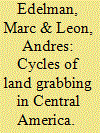

|
|
|
|
|
| Publication |
2013.
|
| Summary/Abstract |
The lack of historical perspective in many studies of land grabbing leads researchers to ignore or underestimate the extent to which pre-existing social relations shape rural spaces in which contemporary land deals occur. Bringing history back in to land grabbing research is essential for understanding antecedents, establishing baselines to measure impacts and restoring the agency of contending agrarian social classes. In Central America each of several cycles of land grabbing-liberal reforms, banana concessions and agrarian counter-reform-has profoundly shaped the period that succeeded it. In the Bajo Aguán region of Honduras-a centre of agrarian reform and then counter-reform-violent conflicts over land have been materially shaped by both peasant, landowner and state repertoires of contention and repression, as well as by peasants' memories of dispossession.
|
|
|
|
|
|
|
|
|
|
|
|
|
|
|
|
| 2 |
ID:
124947


|
|
|
|
|
| Publication |
2013.
|
| Summary/Abstract |
Contemporary large-scale land deals are widely understood as involving the expulsion of people who, in turn, struggle instinctively to resist dispossession This is certainly true in many instances. Yet this chain of events evidently does not always occur: large-scale land deals do not always result in people losing the land, and many of those who face expulsion do not necessarily respond with the kind of resistance often expected of them. Indeed, much evidence shows that the nature of and responses to big land deals can (and do) vary across and within 'local communities'. Taking off analytically from a relatively narrow selection of cases, the expulsion-resistance scenario is too often assumed rather than demonstrated, thereby leaving many inconvenient facts undetected and unexplained. This suggests a need to step back and problematise the variable and uneven responses 'from below' to land grabbing, both within and between communities. This paper offers an initial exploration into why poor people affected by contemporary land deals (re)act the way they do, noting how issues and processes unite and divide them. This helps explain variation in political trajectories in the context of land grabbing today.
|
|
|
|
|
|
|
|
|
|
|
|
|
|
|
|
| 3 |
ID:
124908
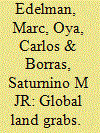

|
|
|
|
|
| Publication |
2013.
|
| Summary/Abstract |
Scholars, practitioners and activists generally agree that investor interest in land has climbed sharply, although they differ about what to call this phenomenon and how to analyse it. This introduction discusses several contested definitional, conceptual, methodological and political issues in the land grab debate. The initial 'making sense' period drew sweeping conclusions from large databases, rapid-appraisal fieldwork and local case studies. Today research examines financialisation of land, 'water grabbing', 'green grabbing' and grabbing for industrial and urbanisation projects, and a substantial literature challenges key assumptions of the early discussion (the emphasis on foreign actors in Africa and on food and biofuels production, the claim that local populations are inevitably displaced or negatively affected). The authors in this collection, representing a diversity of approaches and backgrounds, argue the need to move beyond the basic questions of the 'making sense' period of the debate and share a common commitment to connecting analyses of contemporary land grabbing to its historical antecedents and legal contexts and to longstanding agrarian political economy questions concerning forms of dispossession and accumulation, the role of labour and the impediments to the development of capitalism in agriculture. They call for more rigorous grounding of claims about impacts, for scrutiny of failed projects and for (re)examination of the longue durée, social differentiation, the agency of contending social classes and forms of grassroots resistance as key elements shaping agrarian outcomes.
|
|
|
|
|
|
|
|
|
|
|
|
|
|
|
|
| 4 |
ID:
124936


|
|
|
|
|
| Publication |
2013.
|
| Summary/Abstract |
The contestation and appropriation of water is not new, but it has been highlighted by recent global debates on land grabbing. Water grabbing takes place in a field that is locally and globally plural-legal. Formal law has been fostering both land and water grabs but formal water and land management have been separated from each other-an institutional void that makes encroachment even easier. Ambiguous processes of global water and land governance have increased local-level uncertainties and complexities that powerful players can navigate, making them into mechanisms of exclusion of poor and marginalised people. As in formal land management corporate influence has grown. For less powerful players resolving ambiguities in conflicting regulatory frameworks may require tipping the balance towards the most congenial. Yet, compared with land governance, global water governance is less contested from an equity and water justice perspective, even though land is fixed, while water is fluid and part of the hydrological cycle; therefore water grabbing potentially affects greater numbers of diverse water users. Water grabbing can be a powerful entry point for the contestation needed to build counterweights to the neoliberal, corporate business-led convergence in global resource governance discourses and processes. Elaborating a human right to water in response to water grabbing is urgently needed.
|
|
|
|
|
|
|
|
|
|
|
|
|
|
|
|
| 5 |
ID:
124942
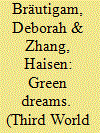

|
|
|
|
|
| Publication |
2013.
|
| Summary/Abstract |
What role does China play in the recent rush for land acquisition in Africa? Conventional wisdom suggests a large role for the Chinese government and its firms. Our research suggests the opposite. Land acquisitions by Chinese companies have so far been quite limited, and focused on production for African consumption. We trace the evolution of strategy and incentives for Chinese agricultural engagement in Africa, and examine more closely several of the more well known cases, sorting out the myths and the realities.
|
|
|
|
|
|
|
|
|
|
|
|
|
|
|
|
| 6 |
ID:
124931
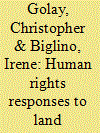

|
|
|
|
|
| Publication |
2013.
|
| Summary/Abstract |
This article approaches the debate on 'contemporary land grabbing' from a human rights perspective, focusing on one right that is particularly threatened: the right to food. It sketches an analytical framework grounded in international human rights law and the contribution such a framework can bring to the land-grabbing debate. Following a brief historical background on the right to food and its articulation in international human rights law, the paper expands on this by focusing on what can be called human rights responses to land grabbing from a right to food standpoint. The analysis considers the contributions of different actors in the human rights sphere and examines the role of the UN Committee on World Food Security and its recently adopted Voluntary Guidelines on the responsible governance of tenure of land, fisheries and forests. It also investigates how the phenomenon has been addressed by the UN human rights mechanisms, drawing on relevant practice of the UN treaty bodies and the Human Rights Council, with a focus on the Special Rapporteur on the right to food and the Special Rapporteur on the human rights situation in Cambodia. The engagement of regional human rights system with the issue of large-scale land transactions is also analysed.
|
|
|
|
|
|
|
|
|
|
|
|
|
|
|
|
| 7 |
ID:
124919


|
|
|
|
|
| Publication |
2013.
|
| Summary/Abstract |
This article examines the contemporary phenomenon of 'land grabbing' in relation to the history of plantation and large- and small-scale farming (PF, LSF and SSF) in sub-Saharan Africa. It looks at the extent of PF and LSF over the 20th century, as well as the policy narratives that have justified, supported or circumscribed their development. Many characteristics of the current land rush and its interpretation reveal elements of continuity with some of the general trends marking the history of PF and LSF up to recent years. In particular, the heterogeneity of PF and LSF, subsuming quite different relations to SSF, and the pivotal role played by the combination of private capital (whether foreign, domestic or combined) with the state represent organisational continuities. Meanwhile continuities in supporting narratives centre on the prevalence of generic prescriptions for either LSF/PF or SSF. Refuting these generic prescriptions is a precondition for more nuanced analysis and policy proposals.
|
|
|
|
|
|
|
|
|
|
|
|
|
|
|
|
| 8 |
ID:
124911
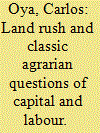

|
|
|
|
|
| Publication |
2013.
|
| Summary/Abstract |
This paper has two main objectives. First, to address the problematic of the socioeconomic impact of land deals in sub-Saharan Africa by looking at what we know from the available literature so far, namely what has been claimed and how much research has been done, as well as why we do not know very much despite the quantity of material published. This is done via a systematic scoping review, which aims to avoid some of the biases inherent in conventional literature reviews and to provide evidence for some basic features of the emerging research on land grabs in Africa, with specific reference to their contribution to the understanding of livelihood impacts. Second, the article links empirical questions about the impact and implications of land grabs with a discussion of alternative (neglected) research questions, notably the implications of the current land rush phenomenon for the classic agrarian questions of capital and labour, as understood in agrarian political economy. Thus the paper proposes a re-engagement with debates on the classic agrarian questions in a Marxist political economy tradition in order to move the land grab research agenda towards more conceptually and empirically challenging research questions.
|
|
|
|
|
|
|
|
|
|
|
|
|
|
|
|
| 9 |
ID:
124927
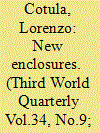

|
|
|
|
|
| Publication |
2013.
|
| Summary/Abstract |
Seven decades after its first publication, Karl Polanyi's The Great Transformation remains one of the most insightful readings about the socioeconomic changes associated with the Industrial Revolution, and the ways in which law facilitated, or countered, moves towards the commodification of land at that time. As today's global land rush brings competing land claims into contest, new transitions are occurring between more commodified and more 'socially embedded' conceptualisations of land. Using Polanyi's framework, this article analyses the role of international law in these processes. International investment law construes land as a commercial asset, can facilitate access to land for foreign investors and imposes discipline on the exercise of regulatory powers in land matters. But shifts in the political economy that underpins international investment law and growing recourse to international human rights law are creating new opportunities for reflecting the non-commercial (cultural, social, political) relations within which land rights remain embedded in many societies. When contrasting conceptualisations of land collide, the relative strength of legal rights and enforcement mechanisms become particularly important. Ultimately, the legitimacy of international law to mediate between competing land claims will depend on the extent to which it can recognise the multiple values that society attaches to land.
|
|
|
|
|
|
|
|
|
|
|
|
|
|
|
|
| 10 |
ID:
124925
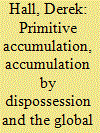

|
|
|
|
|
| Publication |
2013.
|
| Summary/Abstract |
Critical scholars have made extensive use of the concepts of primitive accumulation and accumulation by dispossession to analyse the global land grab. These concepts have been crucial to efforts to understand the land grab in terms of the creation, expansion and reproduction of capitalist social relations, of accumulation by extra-economic means, and of dispossessory responses to capitalist crises. This paper provides an overview of these approaches. It also argues that there are substantial challenges involved in the use of primitive accumulation and accumulation by dispossession, including tensions and ambiguities over what the concepts mean, the assumptions embedded within them and problems of fit with other conceptualisations of the land grab. The paper also highlights resources for engaging with these challenges in the land grab literature.
|
|
|
|
|
|
|
|
|
|
|
|
|
|
|
|
|
|
|
|
|